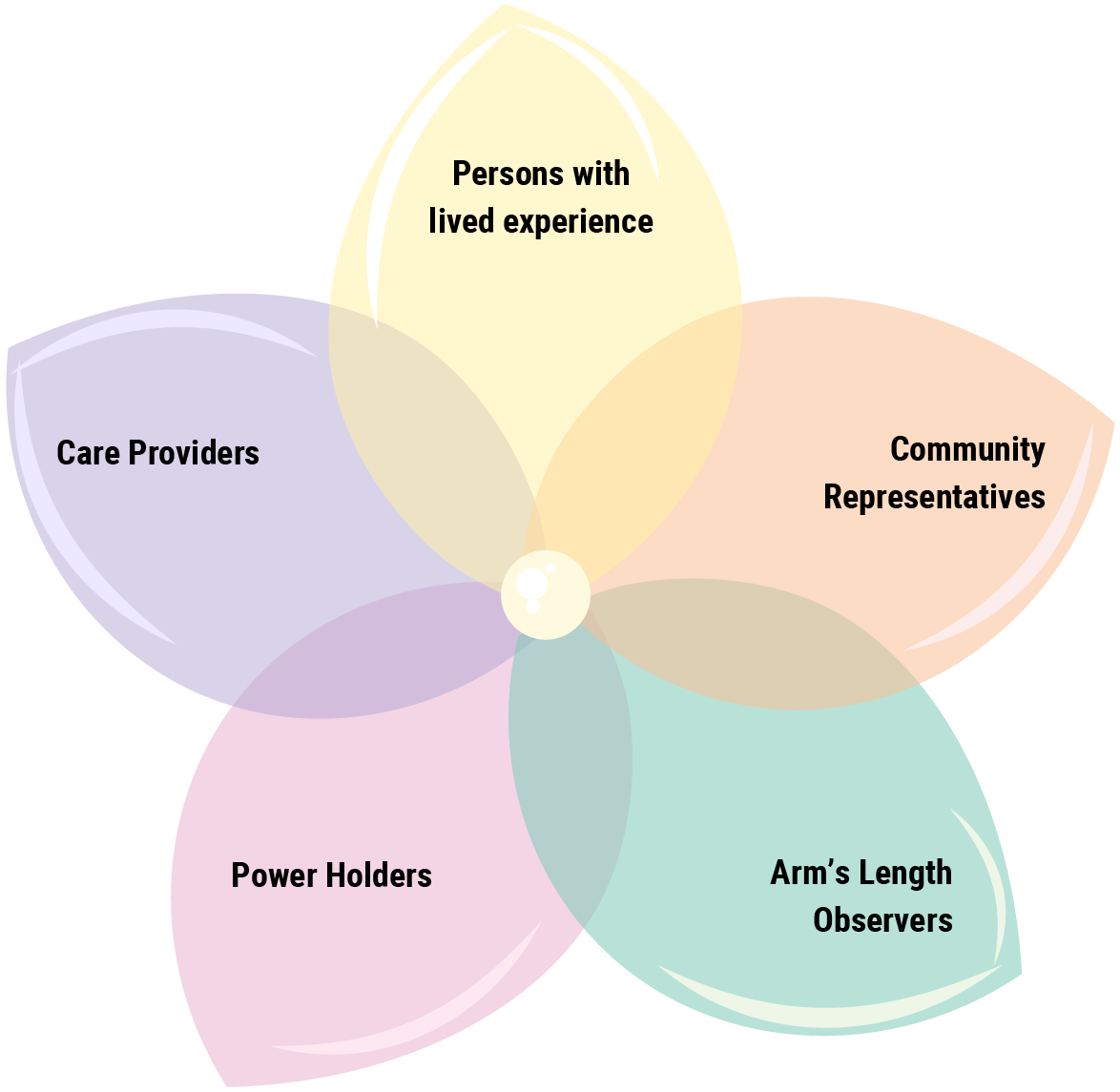4.5 Strategy 3: Seeking Out Lived Experience
While many of the strategies we’ve introduced in this chapter can be applied broadly, accessing lived experience requires extra care. As we discussed in Chapter 2, and continue to explore in Chapter 5, erasing, misrepresenting, and devaluing lived experience causes harm and is considered a form of epistemic injustice. Knowledge that resides in the living is a powerful and valid form of knowledge—but it is not freely available for the taking. Each person has the right to decide how and whether to share their knowledge with us and must determine whether it is safe to do so.
Learning from lived experience requires humility, mutual respect, and a commitment to using that knowledge responsibly. This means listening to others’ stories without centering ourselves, resisting the urge to generalize or cherry-pick ideas, and being mindful of the power dynamics at play (Tsosie et al., 2022). We can easily cause harm by misusing or abusing others’ knowledge and lived experience. So, we share a few tips for seeking lived experience below, with the caveat that truly earning others’ stories takes time and trust.
 Stop and Reflect: Caring for Your Own Lived Experience
Stop and Reflect: Caring for Your Own Lived Experience
Lived experience isn’t just something we seek in others—it’s also something we hold. Recognizing your own capacity to be knowledgeable, equal to that of any other person, is the foundation of knowledge justice (Leibowitz, 2017).
Before exploring how to engage responsibly with others’ stories, take a moment to reflect on your own stories .
- Where do you feel safe being your full self? Think about the stories you share with family, friends, classmates, colleagues, or clients. Are they the same across these groups—or do they shift depending on your audience?
- How does your online presence reflect (or conceal) your lived experience? What stories do you choose to share publicly? Revisit your reflections on positionality from Chapter 1: Where do you hold dominant social identities that make it safer for you to speak up?
- How do you expect others to treat your stories? As you’ll explore in Chapter 5, lived experience can be misused, stolen, or censored. When you share personal knowledge, what do you hope others will do with it? What does this hope suggest in terms of how you treat others’ stories?
All activities can also be found in a downloadable workbook. Visit the ‘Using this Resource‘ page to access the workbook in MS Word and PDF formats.
Asking Others to Share Their Lived Experience
In theory, one way to access lived experience is to ask people directly. Stories, after all, are one of the most powerful forms of knowledge. But doing so requires deep consideration and care, especially within the context of working as members of a helping profession.
When we ask individuals, especially those from equity-denied communities, to speak about their personal experiences, we risk perpetuating epistemic injustice and causing harm if we misunderstand that knowledge, take it out of context, or demand it in ways that require additional labour. Black and Indigenous scholars, for example, have written about the emotional labour they are constantly asked to perform in educating others about equity, diversity, and inclusion, anti-racism, decolonization, or Indigenous knowledges (Cooke & Colón-Aguirre, 2021; Brunette-Debassige, 2024). Requests to ‘share your story’ or ‘explain your oppression’ can be retraumatizing, especially when asked repeatedly or without reciprocity (Tsosie et al., 2022).
Before seeking a person’s lived experience, consider:
- Your positionality: what power do you hold over the person whose knowledge you are seeking?
- Does this person provide a voice or perspective that you’re otherwise missing?
- What is your motivation for seeking out this knowledge? What are your intended uses of this knowledge?
- Can you find this knowledge yourself through existing resources?
- Does the person have or hold this knowledge? Is it relevant to their identity and/or community?
- Are you treating them as partners? Are you learning from them as an equal?
- Are you providing this person with enough time to reflect and engage? Are you giving them space and time to consider your request, or decline it?
- Have you considered ways to mitigate any unintended emotional labour that your request may cause? Are you providing enough compensation, support, and flexibility?
- Are you giving agency to the person to decide how their knowledge should be shared with others, including and outside of you?
(Adapted from Western University, 2025, p. 47–8).
Seek Out Lived Experience That Has Already Been Publicly Shared
One way to engage with lived experience responsibly is to begin with stories that have already been shared publicly. This approach reduces the risk of placing unexpected emotional or educational labour on individuals. It also ensures you’re engaging with knowledge that people have intentionally chosen to make available, in a form and context they are comfortable with.
We have access to many sources of publicly shared lived experience, whether through your local library, community archives, or online platforms. These include:
- Autobiographies, blogs, personal essays
- Public testimony, speeches, or news interviews
- YouTube, community-created documentaries, and other media
- Scholarly work that draws on autoethnography, participatory action research, or community-based methodologies
- As you engage with these resources, be sure to respect any copyright restrictions or cultural protocols that may apply. Your local communities may also have specific guidelines for ethical engagement–for example, protocols for working in solidarity with Indigenous communities (see below).
Watch the short video below about how social media can be used to find examples of lived experience.
Citing Lived Experience
Can you cite lived experience as evidence, say, in a course assignment or academic paper? Two things to consider:
- Before citing someone’s lived experience, make sure you have their permission. Even if you heard someone say something in public, they may not want you to re-use their words in a different context. This is especially true for teachings received from Indigenous Knowledge Keepers and Elders (Western University, 2025).
- Many of the citation and referencing styles you use in academia do not have well-defined rules for citing lived experience. APA, the style we’re using in this resource, discusses this on their style blog here
 . It’s best to speak with your instructor about using lived experience as evidence, to be sure you’re meeting their assignment requirements.
. It’s best to speak with your instructor about using lived experience as evidence, to be sure you’re meeting their assignment requirements.
Interested in this topic? Check out Amy Shawanda’s 2020 article: “Baawaajige: Exploring Dreams as Academic References ![]() ” in the Turtle Island Journal of Indigenous Health.
” in the Turtle Island Journal of Indigenous Health.
Strategy 3: Final Reflection: Application to Our Case Study
To help make sense of the tips outlined in Strategy 3, watch the video below. In it, your chapter authors discuss how they would approach seeking out lived experience perspectives for our case study.
When people "undermine, undercut, disvalue, curtail, exclude, outright dismiss, or, in some cases, gaslight a person/or persons in their capacity as potential knowers" (Dunne, 2020).
Individuals or groups who experience barriers to equal access, opportunities, and resources due to disadvantage and discrimination linked to their social location and/or shared identities.
The respectful rules, guidelines, manners, and etiquettes that are in place to uphold and prioritize Indigenous ways of knowing, being, doing, and belonging.


